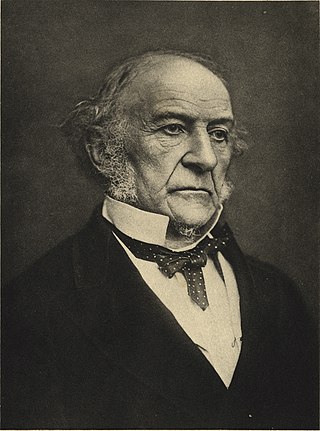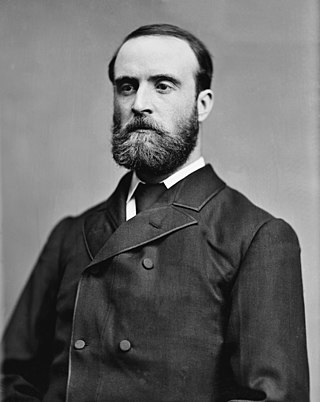Related Research Articles

The Liberal Party was one of the two major political parties in the United Kingdom, along with the Conservative Party, in the 19th and early 20th centuries. Beginning as an alliance of Whigs, free trade–supporting Peelites, and reformist Radicals in the 1850s, by the end of the 19th century, it had formed four governments under William Gladstone. Despite being divided over the issue of Irish Home Rule, the party returned to government in 1905 and won a landslide victory in the 1906 general election. Under prime ministers Henry Campbell-Bannerman (1905–1908) and H. H. Asquith (1908–1916), the Liberal Party passed reforms that created a basic welfare state. Although Asquith was the party leader, its dominant figure was David Lloyd George.

William Ewart Gladstone was a British statesman and Liberal politician. In a career lasting over 60 years, he was Prime Minister of the United Kingdom for 12 years, spread over four non-consecutive terms beginning in 1868 and ending in 1894. He also was Chancellor of the Exchequer four times, for over 12 years. Apart from 1845 to 1847, he was a Member of Parliament (MP) from 1832 to 1895 and represented a total of five constituencies.

Charles Stewart Parnell was an Irish nationalist politician who served as a Member of Parliament (MP) in the United Kingdom from 1875 to 1891, Leader of the Home Rule League from 1880 to 1882, and then of the Irish Parliamentary Party from 1882 to 1891, who held the balance of power in the House of Commons during the Home Rule debates of 1885–1886. He fell from power following revelations of a long-term affair, and died at age 45.

The 1885 United Kingdom general election was held from 24 November to 18 December 1885. This was the first general election after an extension of the franchise and redistribution of seats. For the first time a majority of adult males could vote and most constituencies by law returned a single member to Parliament, fulfilling one of the ideals of Chartism to provide direct single-member, single-electorate accountability. It saw the Liberals, led by William Gladstone, win the most seats, but not an overall majority. As the Irish Nationalists held the balance of power between them and the Conservatives who sat with an increasing number of allied Unionist MPs, this exacerbated divisions within the Liberals over Irish Home Rule and led to a Liberal split and another general election the following year.

The 1874 United Kingdom general election saw the incumbent Liberals, led by William Gladstone, lose decisively, even though their party won a majority of the votes cast. Benjamin Disraeli's Conservatives won the majority of seats in the House of Commons, largely because they won a number of uncontested seats. It was the first Conservative victory in a general election since 1841. Gladstone's decision to call an election surprised his colleagues, for they were aware of large sectors of discontent in their coalition. For example, the nonconformists were upset with education policies; many working-class people disliked the new trade union laws and the restrictions on drinking. The Conservatives were making gains in the middle-class, Gladstone wanted to abolish the income tax, but failed to carry his own cabinet. The result was a disaster for the Liberals, who went from 387 MPs to only 242. Conservatives jumped from 271 to 350. Gladstone himself noted: "We have been swept away in a torrent of gin and beer".
In the United Kingdom, the word liberalism can have any of several meanings. Scholars primarily use the term to refer to classical liberalism. The term can also mean economic liberalism, social liberalism or political liberalism. It can simply refer to the ideology and practises of the historic Liberal Party (1859–1988), or in the modern context, of the Liberal Democrats, a UK party formed after the original Liberal Party's demise.

Justin McCarthy was an Irish nationalist, journalist, historian, novelist and politician. He was a Member of Parliament (MP) from 1879 to 1900, taking his seat in the House of Commons of the United Kingdom of Great Britain and Ireland.

The 1911 Ontario general election was the 13th general election held in the Province of Ontario, Canada. It was held on December 11, 1911, to elect the 106 Members of the 13th Legislative Assembly of Ontario.

The 1879 New Zealand general election was held between 28 August and 15 September 1879 to elect a total of 88 MPs to the 7th session of the New Zealand Parliament. The Māori vote was held on 8 September. A total of 82,271 (66.5%) European voters turned out to vote, plus 14,553 Māori voters. Following the election, John Hall formed a new government.
Oxford University was a university constituency electing two members to the British House of Commons, from 1603 to 1950. The last two members to represent Oxford University when it was abolished were A. P. Herbert and Arthur Salter.

George John Shaw Lefevre, 1st Baron Eversley was a British Liberal Party politician. In a ministerial career that spanned thirty years, he was twice First Commissioner of Works and also served as Postmaster General and President of the Local Government Board.

The Gladstone–MacDonald pact of 1903 was a secret informal electoral agreement negotiated by Herbert Gladstone, Liberal Party Chief Whip, and Ramsay MacDonald, Secretary of the Labour Representation Committee (LRC). The Liberal Party agreed to withdraw parliamentary candidates in some constituencies where the LRC was also standing in order to make sure the anti-Conservative vote was not split.
Gladstone was a parliamentary electorate in the Canterbury region of New Zealand, from 1866 to 1890.
Kaiapoi was a rural New Zealand electorate, north of Christchurch in the Canterbury region of New Zealand from 1861 to 1946. It was represented by twelve Members of Parliament.

John Studholme (1829–1903) was a 19th-century British pioneer of New Zealand, farmer and politician in the Canterbury region of New Zealand.
The Kilmarnock Burghs by-election was a Parliamentary by-election held on 26 September 1911. It returned one Member of Parliament (MP) to the House of Commons of the United Kingdom, elected by the first past the post voting system. The constituency consisted of five parliamentary burghs: Kilmarnock in the county of Ayr, Dumbarton in the county of Dumbarton, Rutherglen in the county of Lanark and Renfrew and Port Glasgow in the county of Renfrew.
The 1942 Tavistock by-election was held on 2 April 1942. The by-election was held due to the death of the incumbent Conservative MP, Mark Patrick. It was won by the Conservative candidate Henry Studholme, who was unopposed due to the War-time electoral pact.
Glenn James Butcher is an Australian politician currently serving as the Queensland Minister for Regional Development and Manufacturing and Minister for Water. He previously served as the Assistant Minister for Local Government and Infrastructure and Assistant Minister for Transport and Infrastructure respectively. He has been the Labor member for Gladstone in the Queensland Legislative Assembly since 2015.
John Studholme Brownrigg was an English merchant and British Conservative Party politician who sat in the House of Commons from 1835 to 1847.
The 1867 Kaiapoi by-election was a by-election held on 5 July 1867 during the 4th New Zealand Parliament in the Canterbury electorate of Kaiapoi.
References
- ↑ "The Gladstone Election". Timaru Herald . 4 January 1879.
- ↑ "Gladstone Election". The Globe. 4 January 1879.